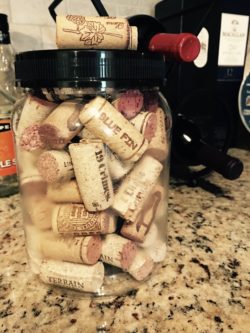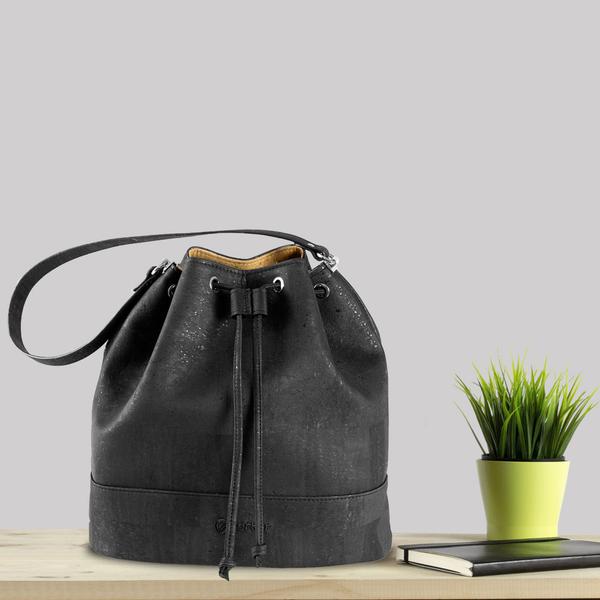My husband and I collect wine corks. Some are special, like the wine we drank on our honeymoon, and others come from $4 bottles of wine from Trader Joe’s. It started off as a sentimental activity and now it has evolved into another weird quirk of ours. A couple of weeks ago we stopped by World Market for a Saturday afternoon wine tasting–a favorite pastime of ours–and we saw a bin where shoppers can recycle their old wine corks. It never occurred to me to recycle wine corks and I was curious to know why this store was asking for my old, stained wine corks.

Our jar of wine corks!
After I did a little bit of research, I understood just how important cork forests are to the environment. According to the Cork Forest Conservation Alliance, cork forests are one of the most sustainable forests in the world, holding some of the planet’s highest levels of forest biodiversity supporting endemic plants and endangered species. It’s not that the world is experiencing a cork shortage–we actually have enough cork to close all wine bottles produced in the world, for the next 100 years—cork recycling actually helps promote the use of cork for products and industries that were not using cork before. It also helps thousands of producers maintain a sustainable income to support their families.
 Beautiful vegan bag made out of cork, crafted in Portugal! Corkor bucket bag
Beautiful vegan bag made out of cork, crafted in Portugal! Corkor bucket bag
Although synthetic screw caps and plastic closures provide a cheaper, more consistent alternative to cork, these products are extremely harmful to the environment. For example, screw caps are not made from a sustainable material. They are not being recycled in the United States, and are not biodegradable. Plastic closures are made from petro-chemicals, are not biodegradable, and are rarely recycled.
The single greatest threat to the cork forests is a reduction in global demand. Thankfully, we have some ways to take matters into our own hands. Below are three organizations that empower you to get involved in the cork repurposing process.
Cork Club
Cork Club is a sustainability initiative funded by WIDGETCO to benefit Forest and Ocean Conservation. This company offers free shipping labels for the public to ship in their old, used corks. Once received, Cork Club donates 2 cents for each cork to support a number organizations that protect forests, reduce ocean garbage and protect beaches. To date, Cork Club has donated over $120,000 to these causes.
Create a free Cork Club shipping label here!
ReCORK
ReCORK is North America’s largest natural wine cork recycling program. This program collects, grinds, ships, and manufactures recycled cork into sustainable products free of harmful materials. ReCORK also works with over 3,000 cork collection partners, has planted more than 8,000 cork oak trees in the Mediterranean forest and the Criar Bosques project in Portugal, and recycled over 70 million corks.
You can get involved by visiting a ReCORK drop-off center to deliver your old corks, or you can ship your corks directly to ReCORK. If you want to ship your corks, you will need a minimum of 15-lb. of corks, so work together with your friends, family, or local restaurants!
Whole Foods Cork ReHarvest
Whole Foods Market partnership with Cork ReHarvest, a nonprofit and Rainforest Alliance-endorsed organization that has been working with Whole Foods to recycle corks since 2008. Whole Foods Cork ReHarvest recycles wine corks in a different way depending on the regional delivery location. According to the website, west of the Rockies, corks will be delivered to Western Pulp, where they will be recycled into wine shippers containing 10% cork. In the Midwest United States, corks will be sent to Yemm & Hart, which creates unique cork floor tiles. Finally, on the East Coast and in the UK, corks will be transported to Jelinek Cork Group, where old corks will be made into post-consumer products.
All you have to do is visit a Whole Foods Market and drop your corks into the convenient Cork ReHarvest box!
We can all do our part to improve the health and wellness of the world we live in. Buying and recycling natural wine corks is an easy way to start.
Where do you plan to repurpose your old wine corks?
Also by Olivia: Just Say No To Shame–4 Ways To Support Mental Health Awareness Week
Energizing Double Chocolate Chip Truffles
Get more like this—Subscribe to our daily inspirational newsletter for exclusive content!
__
Photo: Olivia Parr, Corkor, Pixabay




